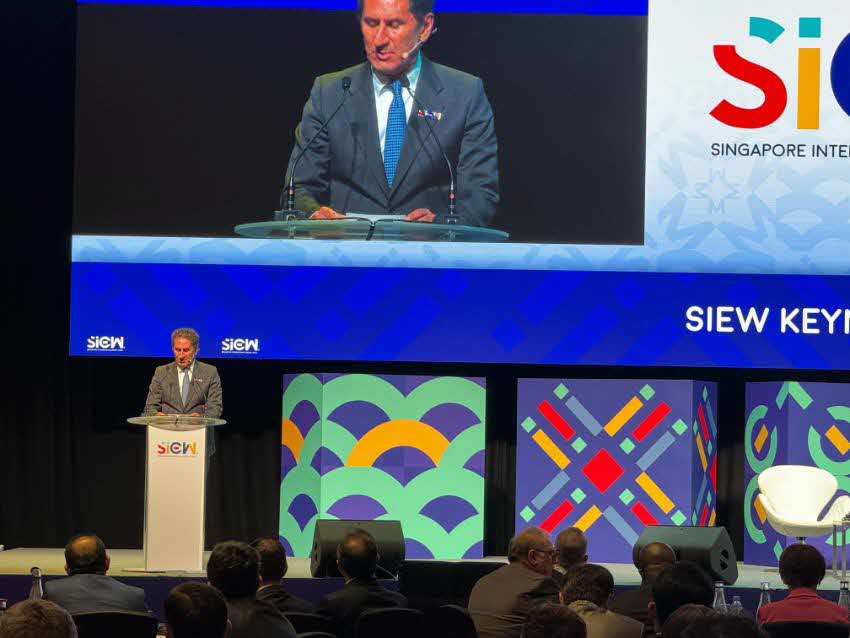Francesco La Camera, Director-General of the International Renewable Energy Agency, says "much still needs to change, and we need to change fast" to limit global warming to 1.5°C.

Francesco La Camera, Director-General of the International Renewable Energy Agency (IRENA), took the stage during the SIEW Opening Keynote Address of the Singapore International Energy Week (SIEW) 2023, outlining his vision for accelerating the pathways to a net zero world.
In his address, Mr La Camera emphasised the need for a paradigm shift to sustain the energy transition and mobilise global efforts to address the challenges of our time.
He pointed out that there is now increasing global alignment with IRENA’s longstanding estimates, which were considered too ambitious but are now widely recognised. The World Energy Transitions Outlook 2023 made it clear that to stay on track with the 1.5°C pathway, renewable energy capacity must triple and energy efficiency must double by 2030.
Mr La Camera also highlighted that the voluntary Global Cooling Pledge, spearheaded by the COP28 Presidency, has garnered the support of 220 companies to date. He urged leaders at SIEW 2023 to sign the pledge, emphasising its significance in the global effort to combat climate change.
Challenges on the road to net zero
The Director-General underscored that "much still needs to change, and we need to change fast". By 2030, cumulative investments must amount to US$44 trillion, with 80 percent of this total, or US$35 trillion, directed towards transition technologies. This prioritises efficiency, electrification, grid expansion, and flexibility. Public sector intervention is essential to channel investments towards countries more equitably. In 2022, 85 percent of global renewable energy investment benefited less than 50 percent of the world’s population.
Mr La Camera also expressed concern about the concentration of renewable energy deployment in a few countries over the past decade. He emphasised the need to diversify and scale up efforts for achieving net zero, and commended Singapore "as a leader in adapting and modernising export and shipping sector for renewables-based energy systems and trade".
Renewable energy and job creation
A faster deployment of renewables is crucial for achieving the energy transition and creating more jobs. Mr La Camera highlighted IRENA's findings, stating that the number of jobs in the renewable energy sector has doubled. This reached a global total of 13.7 million in 2022, up from 12.7 million in 2021. However, he noted that the majority of these jobs are concentrated in countries with the capacity to deploy renewable energy at scale.
Accelerating towards net zero
With the region experiencing impressive growth over the last few decades, Mr La Camera stressed the need for clear direction to ensure long-term emissions reductions over short-term economic gains. "I encourage the region to prioritise climate action, foster regional collaboration for deep emission reduction, and increase local private-sector participation," he said.
He also emphasised the commitment to triple renewables, phase out fossil fuel substitutes, invest in infrastructure, and adopt smart grid technology to accelerate progress towards net zero. While he acknowledged the monumental challenges and scale of the transition, Mr La Camera expressed the importance of "political will" and the need for "steadfast commitment to deliver".
Charting a sustainable energy future in Southeast Asia
Mr La Camera stressed that the next seven years will be critical to bringing the world back on track with the 1.5°C pathway. He highlighted renewables and energy efficiency as readily available and economically feasible technologies for mitigating climate change while ensuring energy security and affordability.
Francesco concluded with an optimistic outlook, stating that "we are going towards a new energy system that will be largely enabled by renewables, hydrogen, and sustainable biomass. All these will help to fight climate change".
Follow us for more timely updates on X (formerly Twitter) and Telegram.